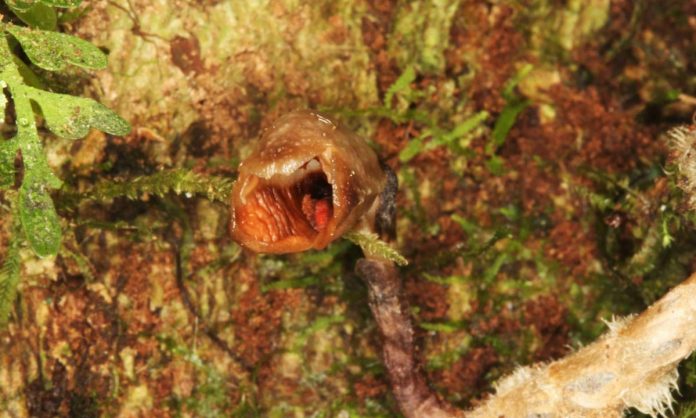The “ugliest orchid in the world”, a toadstool discovered at Heathrow airport, and a bizarre scaly shrub have topped a list of new species named by scientists at the Royal Botanic Gardens at Kew and their collaborators in 2020.
The researchers said the 156 new plants and fungi highlighted the amazing diversity of species that remain to be found, with the potential to provide new crops, medicines and gardener’s favourites. One is a morning glory plant, whose sweet purple tubers are already eaten by local people in the high Andes of Peru.
A third of the new species are orchids, but one confounded the family’s reputation for great beauty, with RGB Kew calling it the “ugliest in the world”. The plant – Gastrodia agnicellus – was found in a national park in Madagascar and its 11mm flowers are brown, fleshy and grotesque, and are likely to be pollinated by flies.
The orchid remains underground in the deep shade of a humid forest most of the time, emerging only to flower, but it has “a noticeable musk rose-like scent”, the scientists said.
“In a difficult year, it’s so thrilling to see botanical and mycological science continue, with a bumper list of incredible newly named species,” said Martin Cheek at RBG Kew. “There are some amazing new finds, each with their own unique qualities and potential for humanity.”
“However, the bleak reality facing us cannot be underplayed: with two in five plants threatened with extinction, it is a race against time to find, identify, name and conserve plants before they disappear,” he said.
There were six new webcap toadstools named in the UK in 2020, all from a genus known to be important in supporting the growth of oak, beech and birch trees. Cortinarius heatherae was discovered along the river on the boundary of Heathrow airport by the mycologist Andy Overall and named after his wife, Heather. Three were found in Scotland, one in Brighton and another in woods at Barrow-in-Furness.
The strangest new species was a dwarf shrub with bizarre scaly leaves that grows in extremely hot natural salt pans in Namibia. Its name – Tiganophyton – is derived from the Greek word τηγάνι (tigani), which means frying pan. DNA analysis showed the plant is part of the cabbage order, but represents a completely new family – such discoveries are rare.
Among the new orchids, 19 tree-dwelling species are from the tropical paradise island of New Guinea, one with spectacular golden orange flowers and others having hair-like tufts on their flowers.
A beautiful new bromeliad discovered on a forest-shaded limestone cliff in Brazil was one of the species already under threat. The scientists believe the plant is pollinated by hummingbirds but only 25 plants were found and the extraction of limestone to make cement is a serious threat in this area. Another new species is a shrub related to blueberries found in Indonesian New Guinea, close to the world’s largest gold mine.
Other finds included two new species of succulent-leaved aloe in Madagascar, which may have the medicinal benefits already known in aloe vera, and a new herb from the medicinally important plant family Apocynaceae, whose members are used to treat health issues such as flatulence, gonorrhoea, paralysis, burns, and fungal skin infections. The herb was found in the Chirinda forest of Zimbabwe but only a few plants are known to exist.
One discovery did not involve scientists tramping through jungles or across mountains but was found by searching online. The spectacular Tanzanian hibiscus was found by the Australian specialist Lex Thomson, who was studying online images of historic herbarium specimens. The new plant has great potential for gardeners as it can withstand much drier conditions than the well-known Hibiscus schizopetalus.





























